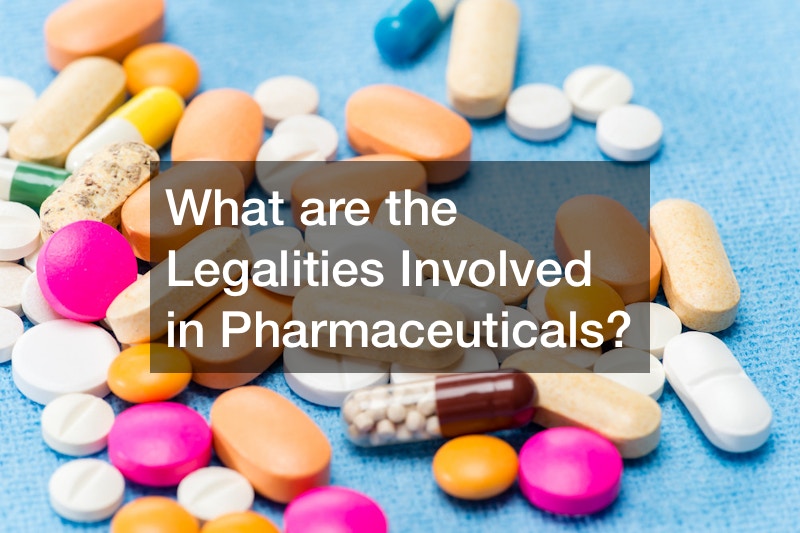What are the Legalities Involved in Pharmaceuticals?

The pharmaceutical industry is a vast and intricate field where innovation meets stringent regulations. Pharmaceutical companies play a pivotal role in healthcare, but they are also subject to a multitude of legalities, ranging from patent disputes to environmental concerns like pollution liability.
In this article, we will delve into the legal aspects that pharmaceutical companies face.
The Patents Battle
One of the primary legal challenges encountered by these pharmaceuticals is the protection of their intellectual property, often in the form of patents. Patents grant exclusive rights to the creators, allowing them to produce and market their products without competition for a set period. This exclusivity encourages innovation but leads to disputes when patents are infringed upon.
In the fast-paced world of pharmaceuticals, patents also play a crucial role in determining market exclusivity. Generic drug manufacturers often seek to challenge the patents held by pharmaceutical companies to introduce more affordable alternatives to the market. This leads to a constant battle between innovators defending their intellectual property and generic manufacturers aiming to bring cost-effective versions of drugs to consumers.
Dispute Resolution in Pharmaceuticals
When patent disputes or other legal conflicts arise, pharmaceutical companies must navigate the complex world of dispute resolution. Traditional litigation can be expensive, time-consuming, and disruptive to business operations. This is where alternative dispute resolution (ADR) methods come into play.
Alternative Dispute Resolution (ADR)
ADR offers a more efficient and cost-effective way to resolve disputes within the pharmaceutical industry. Mediation and arbitration, two common ADR techniques, provide a platform for parties to negotiate and settle their differences outside of court.
Mediation entails a neutral third party who helps in facilitating discussions and finding a mutually agreeable solution. It is a less adversarial process, allowing pharmaceutical companies to maintain a more amicable relationship while addressing their concerns.
Arbitration, on the other hand, is more formal than mediation and resembles a mini-trial. The parties present their cases to an arbitrator, who then issues a binding decision. Arbitration is often chosen when parties prefer a legally binding resolution but still want to avoid the complexities of traditional litigation.
Environmental Concerns and Pollution Liability
In recent years, pharmaceutical companies have gone through increasing scrutiny regarding their environmental impact and pollution liability. The production of pharmaceuticals involves chemical processes and waste disposal, which can have adverse effects on the environment. These concerns have led to legal regulations and liability issues.
Pollution liability refers to a company’s responsibility for any environmental damage caused by its operations. Pharmaceutical companies must adhere to strict environmental laws and regulations to minimize pollution and avoid legal consequences.
Compliance and Regulatory Challenges
The pharmaceutical industry is heavily regulated, ensuring the safety and efficacy of drugs. Compliance with these regulations is not optional but mandatory, and violations can result in legal actions and penalties. Pharmaceutical companies must traverse a complex web of regulatory entities, including the Food and Drug Administration (FDA), and international agencies, depending on their market reach.
Global Reach and International Legalities
Pharmaceutical companies often operate on a global scale, which introduces additional legal complexities. They must adhere to diverse sets of laws and regulations in various countries. These international legalities encompass intellectual property protection, pricing and reimbursement regulations, and clinical trial requirements, among others.
Furthermore, navigating international legalities also involves intricate trade agreements and export-import regulations. Pharmaceutical companies must pay close attention to trade treaties and agreements between countries, as these can affect the flow of pharmaceutical products across borders. Tariffs, trade barriers, and customs procedures can affect the cost and availability of medications in different regions.
Additionally, international legal considerations extend to issues of ethics and corporate social responsibility, as companies must adhere to global standards while operating in culturally diverse markets. Staying well-informed about these international legal intricacies is essential to maintain a strong global presence and ensure compliance with both local and international laws.
Demystifying the Legalities in Pharmaceutical Companies
In conclusion, pharmaceutical companies face many legal challenges, from protecting their patents to addressing pollution liability and complying with stringent regulations. The complexities of the industry demand efficient dispute resolution methods like alternative dispute resolution (ADR) to navigate legal conflicts while maintaining productive business relationships.
As the pharmaceutical landscape continues to evolve, staying informed and working with experts like Judge W. Royal Furgeson in addressing legalities will be crucial for companies to stay ahead in this field.


